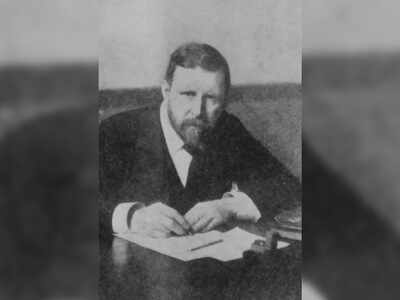Trending
This story is from October 30, 2018
Bram Stoker used London Library books for research
Many of the actual copies used by Bram Stoker for his mastepiece are still in the London Library, with his notes!

Photo: bramstoker.org
Bram Stoker is best known for his classic vampire horror novel, Dracula. A book many would be returning to now that the horror mood of Halloween has set the ball rolling.
The book is about a vampire, a creature that looks and acts human but is a monster that kills humans by drinking their blood. Though it was not a bestseller in it's time, it was well reviewed and it's popularity has stood the test of time.
The monster is inspired by a real life prince of Wallachia, Vlad III Dracula, and contains many historical references. Now, it has been discovered that he did most of his research at the London Library!
Bram Stoker used to be a member of the historical members' lending library, based in London's St James' Square. He took various notes for his work and listed their sources too. The London Library has found it has original copies of 26 of these books. Many of them carry markings similar to the ones he used in his own notes. The Library feels they were made by Stoker when researching his masterpiece.
The books with his annotations found in them were Round About the Carpathians by A F Crosse, Book of Were-Wolves by Sabine Baring-Gould, Transylvaniaby Charles Boner and Necromancy - Divination of the Dead by Thomas Browne.
“Bram Stoker followed the same path that many writers have pursued before and since - using the Library to transition into a serious writing career, and drawing heavily on the Library’s collection to seek inspiration and ideas for his masterpiece. With the Library’s incredible list of members past and present, some of the most famous characters in fiction must have been developed here – with today’s discovery we can feel sure that Dracula was one of them. We hope that many aspiring writers will follow Bram Stoker’s example and use The London Library as a source of inspiration and support when creating their own masterpieces,” Philip Marshall, the director of the London Library told the Bookseller.
Writers and readers have always found refuge in libraries, let's hope such places shall always exist for people who need them.
The book is about a vampire, a creature that looks and acts human but is a monster that kills humans by drinking their blood. Though it was not a bestseller in it's time, it was well reviewed and it's popularity has stood the test of time.
The monster is inspired by a real life prince of Wallachia, Vlad III Dracula, and contains many historical references. Now, it has been discovered that he did most of his research at the London Library!
Bram Stoker used to be a member of the historical members' lending library, based in London's St James' Square. He took various notes for his work and listed their sources too. The London Library has found it has original copies of 26 of these books. Many of them carry markings similar to the ones he used in his own notes. The Library feels they were made by Stoker when researching his masterpiece.
This discovery was made by Philip Spedding, the library’s development director. He told The Bookseller, “Bram Stoker was a member of The London Library but until now, we have had no indication whether or how he used our collection. Today’s discovery changes that and we can establish beyond reasonable doubt that numerous books still on our shelves are the very copies that he was using to help write and research his masterpiece.”
The books with his annotations found in them were Round About the Carpathians by A F Crosse, Book of Were-Wolves by Sabine Baring-Gould, Transylvaniaby Charles Boner and Necromancy - Divination of the Dead by Thomas Browne.
“Bram Stoker followed the same path that many writers have pursued before and since - using the Library to transition into a serious writing career, and drawing heavily on the Library’s collection to seek inspiration and ideas for his masterpiece. With the Library’s incredible list of members past and present, some of the most famous characters in fiction must have been developed here – with today’s discovery we can feel sure that Dracula was one of them. We hope that many aspiring writers will follow Bram Stoker’s example and use The London Library as a source of inspiration and support when creating their own masterpieces,” Philip Marshall, the director of the London Library told the Bookseller.
Writers and readers have always found refuge in libraries, let's hope such places shall always exist for people who need them.
End of Article
FOLLOW US ON SOCIAL MEDIA









